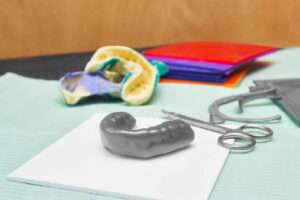When it comes to restoring damaged teeth, dental crowns, and bridges are popular solutions that offer both functionality and aesthetics. Crowns help reinforce weakened or cracked teeth, while bridges replace missing teeth, ensuring that you can chew, speak, and smile confidently. However, simply having crowns or bridges doesn’t mean your dental work is invincible. Many people mistakenly believe that once they have a crown or bridge, they are no longer at risk for cavities or other dental problems, but this is far from the truth.
Let’s cover how crowns and bridges work, why maintaining good oral hygiene is still critical, and the best ways to care for these restorations.
What Are Crowns and Bridges?
Crowns and bridges are prosthetic devices cemented onto natural teeth or dental implants to restore your smile’s functionality. While they are durable and long-lasting, they require proper care to avoid complications.
- Dental Crowns: A crown is a cap that fits over a damaged or decayed tooth to protect it. Crowns can also improve the appearance of a misshapen or discolored tooth. They are commonly made from materials like porcelain, ceramic, or metal and are designed to look and function like natural teeth.
- Dental Bridges: A bridge replaces one or more missing teeth. It typically involves two crowns placed on the teeth adjacent to the gap (called abutments), with a prosthetic tooth (pontic) in between. Bridges help restore your bite, prevent neighboring teeth from shifting, and improve the overall look of your smile.
Why Crowns and Bridges Still Need Proper Care
Some patients assume that once they have crowns or bridges, they no longer need to worry about tooth decay or gum disease, but that’s a dangerous misconception. While these restorations protect the visible surfaces of the teeth, the teeth beneath the crown or around the bridge are still vulnerable to plaque and bacteria.
Here are a few important facts to keep in mind:
- Cavities Can Develop Underneath Crowns: The natural tooth structure beneath a crown can still decay if plaque builds up at the gumline or if the crown becomes loose over time. This is known as recurrent decay, and it can lead to infections or the need for a crown replacement if left untreated.
- Gum Disease Can Affect the Stability of Bridges: A bridge relies on the support of the abutment teeth or implants holding it in place. If gum disease weakens these supporting teeth, the bridge may become unstable or fail altogether. Healthy gums are crucial for keeping bridges secure.
- Oral Hygiene Is Just as Important as Before: Although crowns and bridges provide reinforcement, you still need to brush and floss regularly to prevent plaque from forming along the gumline or in hard-to-reach areas. Poor oral hygiene can lead to infections, tooth sensitivity, and gum recession.
Tips for Taking Care of Your Crowns and Bridges
Proper care of your crowns and bridges will extend their lifespan and ensure that your entire mouth stays healthy. Below are some essential tips to help you maintain these restorations:
1. Brush Twice a Day with a Soft-Bristle Toothbrush: Use a soft-bristle toothbrush to clean your teeth and restorations thoroughly. Hard-bristled brushes can scratch porcelain or ceramic crowns, reducing their shine over time. Pay special attention to the gumline, as plaque often accumulates at the base of crowns and bridges.
2. Floss Daily, Especially Around Bridges: Flossing can seem tricky with crowns and bridges, but it’s essential for removing plaque between teeth. For bridges, use a floss threader or specialized dental floss designed to slide under the pontic (the replacement tooth) and clean the surrounding area. Interdental brushes can also help clean tight spaces that are hard to reach with traditional floss.
3. Rinse with an Antibacterial Mouthwash: A good-quality antibacterial mouthwash can reduce plaque buildup and fight gum disease. Rinsing daily will help maintain a healthy environment around your crowns and bridges, protecting the supporting teeth and gums.
4. Avoid Hard or Sticky Foods: While crowns and bridges are durable, they are not indestructible. Biting down on hard foods like ice or nuts can chip or crack crowns, while sticky foods such as caramel or chewing gum can pull a bridge loose. Be mindful of what you eat to avoid unnecessary damage to your restorations.
5. Use a Nightguard If You Grind Your Teeth: If you suffer from bruxism (teeth grinding), it’s crucial to wear a nightguard to protect your crowns and bridges. Grinding can wear down the materials over time, leading to cracks or the need for early replacements.
6. Schedule Regular Dental Checkups: Routine dental visits are essential for maintaining both your natural teeth and your restorations. During your checkup, your dentist will examine your crowns and bridges for any signs of damage or decay and ensure they are still functioning properly.
Signs That Your Crown or Bridge May Need Attention
Even with proper care, crowns and bridges can experience wear and tear. Here are some warning signs that it may be time to visit your dentist:
- Pain or Sensitivity: If you feel pain around a crown or bridge, it could indicate that decay or gum disease has developed.
- Looseness: If your crown or bridge feels loose or unstable, schedule an appointment immediately to prevent further damage.
- Visible Damage: Chipped or cracked crowns may need repair or replacement to avoid further complications.
- Discoloration: If your crown or bridge starts to look discolored, it might indicate plaque buildup or damage to the material.
How Long Do Crowns and Bridges Last?
With proper care, crowns and bridges can last 10 to 15 years or more. However, their lifespan depends on several factors, including your oral hygiene habits, diet, and whether you visit your dentist regularly. If you neglect proper care, these restorations may need to be replaced sooner than expected.
Protect Your Restorations with Professional Care
Whether you’ve recently received a crown or bridge or have had one for years, it’s essential to keep up with good oral hygiene and regular dental visits. At Fernandez, DMD, we are committed to helping you maintain a healthy smile for life.
If you have any questions about your crowns or bridges or if it’s time for your next dental checkup then schedule an appointment with us today! Our experienced team will ensure your restorations are in excellent shape and provide personalized care to keep your smile looking and feeling great. We are conveniently located at 502 E. Olympia Ave., Punta Gorda, FL 33950. You may also call us at 941-639-1124 to book your appointment.
With the right care, you can protect both your restorations and your natural teeth, enjoying the confidence and comfort of a healthy smile. We look forward to helping you maintain a healthy, beautiful smile!





